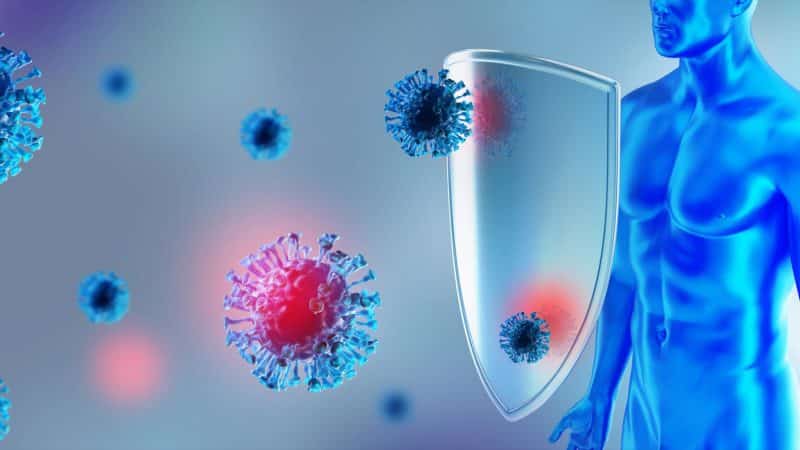HOME > reinvent healthcare podcast > Boosting The Immune System to Slow Immunosenescence.
Boosting The Immune System to Slow Immunosenescence.
By Ritamarie Loscalzo

The health of the immune system impacts all aspects of overall health. But with age, the immune system changes. It not only weakens, it also becomes imbalanced.
This process is known as “immunosenescence”.
Although lifespans have become longer, “health spans” haven’t. The reality is that many people in developed countries are living longer lives but are unable to enjoy them due to diminished health in later years.
Why does this happen and how can you boost the immune system to support clients in mitigating the effects of immunosenescence?
The Aging Immune System
Like gray hair, everyone ages differently. There is no exact time that immune function begins to diminish, but the process is generally the same for everyone.
Innate Immune Response
The innate immune response becomes less able to identify foreign antigens so is slow to act. In addition, the initial protective inflammatory response fails to resolve itself which leads to chronic, systemic inflammation. Called “inflammaging”, I discuss this in more detail in Inflammation- The Silent Killer.
As a result, autoimmune disorders become more common as do conditions associated with chronic, low-grade inflammation such as cancer, cardiovascular disease, dementia and type 2 diabetes.
The aging immune system also produces less of the proteins that are key to the complement cascade in response to bacterial infections. This can result in more frequent urinary tract and skin infections.
Adaptive Immune Response
T-cells are key to the adaptive immune response. Although the total number of T-cells remains constant as we age, the number of “naïve” T-cells available to be educated to recognize new pathogens steadily declines. Because of this, older bodies are less able to generate an effective immune response to new infections.
This may be one reason why older adults do not respond well to vaccinations. Ironically, research suggests a lifetime of influenza vaccinations may diminish the effectiveness of annual vaccines later in life.
Senescent Immune Cells
It’s believed the aging immune system’s inability to switch to the anti-inflammatory response after the initial infection or injury is due to an accumulation of “senescent” immune cells.
At the tip of each chromosome is a protective cap called a telomere. Telomeres protect the DNA during cell replication. Each time a cell divides, the telomeres get shorter until division eventually stops completely. If the cell survives, it becomes more and more dysfunctional, producing cytokines which promote inflammation.
Macrophages
Macrophages slow down so they are less quick at destroying bacteria, cancer cells and other antigens. This may be one reason cancer is more common among older people.
Ways To Support the Aging Immune System
Age-related changes in the immune system play a critical role in declining health, so what can you do to empower clients to better their health in later years?
Fortunately, anything that is done to support health in the early years helps optimize health as you age. Reducing stress, getting plenty of good sleep, and addressing any illness before it becomes chronic all benefit the quality of later years.
However, research is finding three specific factors to be especially important when it comes to supporting an aging immune system: physical activity, diet, and weight.
Physical Activity
Research shows that exercise has a profound effect on immune function, but now there is evidence to suggest that it can slow or possibly reverse some of the effects of immunosenescence.
Skeletal muscles produce proteins called myokines that reduce inflammation and preserve immune health. Maintaining muscle mass protects against infection and chronic conditions associated with age such as type 2 diabetes and cardiovascular disease.
One study found that the more aerobically fit a person was, the fewer senescent T-cells in their blood and the more naïve T-cells.
Exercise can boost the immune system at any age!
Diet
Before I talk about diet, I want to restate my belief that there is no one perfect diet for everyone. I review this in The False Gods of Food Religion.
It’s critical to determine what works best for each individual and serves their best health. In my program, Empowered Self-Care, members who are struggling with hidden food sensitivities are supported through an elimination diet which helps them determine once and for all what foods work or don’t work for them.
As it stands, several studies have looked at the Mediterranean diet and found those that follow it are less likely to become frail (lose muscle strength, walk slowly, tire easily) and are at a lower risk of obesity, type 2 diabetes, cardiovascular disease and cancer.
This is suspected to be due to its anti-inflammatory properties which is key to immune health. If you stay away from oils and animal products, there are many ways to eat that are anti-inflammatory. You just have to determine what works best.
Weight
Research is finding adipose tissue around the organs and under the skin may make a significant contribution to inflammaging. Up to 30% of a type of inflammatory cytokine in the bloodstream may come from adipose tissue.
Studies have also suggested that the immune system of overweight people may produce fewer antibodies in response to the flu vaccine. This implies the same is likely to happen when exposed to any pathogen.
People often gain weight as they age due to inactivity. To avoid the negative affects on the immune system due to excess adipose fat, it’s important to maintain a moderate weight.
Taking action to counteract immunosenescence
An aging immune system can feel remote to younger clients, but illness can impact anyone at any time. Helping them to develop habits that boost the immune system throughout their life will serve them at any age.
Many times I find the biggest challenge with clients is inspiring or motivating them to take action. In the past when they didn’t, I felt somehow responsible.
Ultimately, I had to accept the fact that only they can make the changes necessary to achieve their best health. All I can do is provide the knowledge and support they need that will empower them to make an informed decision when they are ready to do so or have no other choice.
My confidence came from knowing I had the education to back up my recommendations as well as support from like-minded colleagues going through the same thing.
Graduates from my Nutritional Endocrinology Training Program (NEPT) have both. I would love for you to join us.
References:
Longevity leap: mind the healthspan gap | npj Regenerative Medicine
The untwining of immunosenescence and aging | SpringerLink
The Immunity Challenge: How aging affects your immune system
How does adipose tissue contribute to inflammageing? – PubMed
Immunosenescence: emerging challenges for an ageing population – PMC
Share this:

Are you feeling stuck?
Do you feel as if something is missing from your practice that's keeping you from delivering breakthrough outcomes for your clients?.
Recent Posts
Our Programs
Nutritional Endocrinology Practitioner Training (NEPT)
The Mastery and Certification tier is our flagship program and provides everything you need to feel confident as a practitioner who knows how to get results that lead to healthy and happy clients.
Functional Assessment Mastery
Explore the relationships between the most important hormones and their relationship with nutrition.
Functional Nutrition Mastery
Learn how to support your clients to eat and supplement in a way that reduces and eliminates chronic symptoms.
Medical Disclaimer: The information on this website is not intended to replace a one-on-one relationship with a qualified health care professional and is not intended as medical advice. It is intended as a sharing of knowledge and information from the research and experience of Dr. Ritamarie Loscalzo, drritamarie.com, and the experts who have contributed. We encourage you to make your own health care decisions based upon your research and in partnership with a qualified health care professional.
Disclosure: Sometimes (but not always), when I share resources in my programs, newsletter, and on my website, I'm using an affiliate link, which means I do make money if you buy. My credibility is extremely important to me; therefore, I only endorse the products, services, and people I believe in. DrRitamarie.com is independently owned and the opinions expressed here are my own.
Click here to see our Privacy Policy.







